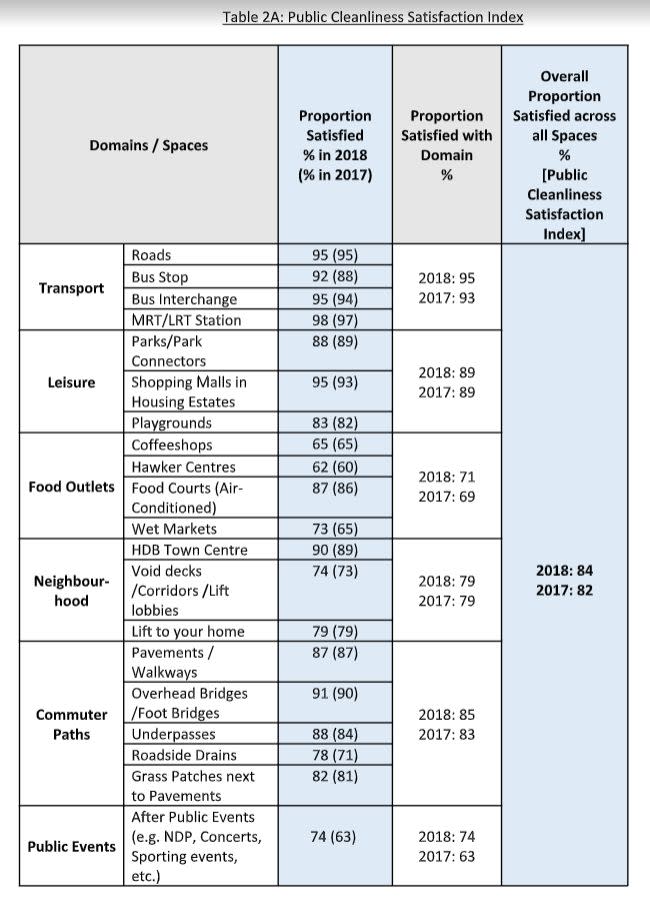Almost half of Singapore residents clear their food utensils at hawker centres: survey

SINGAPORE — More Singapore residents are clearing their own food utensils with less noticing rubbish, such as cigarette butts or used tissue paper, at hawker centres, according to a survey on public cleanliness satisfaction.
About 48.7 per cent of over 2,000 respondents said they clear their own food utensils at hawker centres most or all of the time, according to the 2018 Public Cleanliness Satisfaction Survey’s findings released on Wednesday (15 May). This was an increase from 35 per cent in the 2017 survey.
Only 6.6 per cent said they never clear their own food utensils, down from 16.3 per cent from 2017.
The survey was led by Singapore Management University’s professor of sociology (practice) Paulin Tay Straughan and Institute of Policy Studies’ senior research fellow Dr Mathew Mathews.
A total of 2,005 Singaporeans and permanent residents, aged 21 years old and above, were surveyed from August to December last year. In comparison, 2,000 respondents were surveyed in the first wave of the study between October and March 2017.
More respondents also reported seeing others clear their own food utensils at hawker centres at least some of the time at 88 per cent, up from 80 per cent in 2017.
The survey also showed a drop in the proportion of respondents noticing leftover food (57.2 per cent), used tissue paper (47.8 per cent), disposable items (38.9 per cent), cigarette butts (31.1 per cent) and dirt/stains/graffiti (31.4 per cent), compared with 2017.
However, satisfaction with the cleanliness of hawker centres and other food outlets, including coffeeshops, food courts and wet markets, still ranked the lowest among public spaces at 71.4 per cent, despite an improvement from 68.9 per cent in 2017.
Specifically, 62 per cent were satisfied with the cleanliness of hawker centres. In comparison, 87 per cent were satisfied with the cleanliness of air-conditioned food courts.
“We do have quite a bit of expectation when it comes to places where you eat in. Sometimes, benchmarks (of restaurants and air-conditioned food centres) are what we are looking at, despite progress being made,” said Dr Mathews.
Among the ways to increase satisfaction are to set out clearer norms across food centres, and implement clear signs and areas for returning food trays, said Prof Tay Straughan.
Keeping Singapore clean is everyone’s responsibility, be it in terms of giving feedback and adopting pro-social behaviour in the area of cleanliness, she stressed.

Other public spaces
Among the other public spaces, 95 per cent of respondents said they were satisfied with the cleanliness in transport spaces (roads, bus stops, bus interchanges and MRT/LRT stations), 89 per cent with leisure spaces (parks, shopping malls and playgrounds), 85 per cent with commuter paths, and 79 per cent with neighbour spaces (void decks, lifts, town centres).
In particular, the biggest rise in satisfaction among public spaces was at public events, such as National Day Parades, after their conclusion - 74 per cent in 2018, up from 63 per cent previously.
The main undesirable social behaviours related to cleanliness in public spaces cited by respondents were the same: someone littering, spitting on the ground or not picking up their pets’ poo.

Overall, 94 per cent agreed or strongly agreed that Singapore is a clean city, with almost 89 per cent agreeing or strongly agreeing that Singaporeans take pride in keeping the country clean.
However, the proportion of respondents who felt that visitors to Singapore kept Singapore clean fell to 68.2 per cent from 70 per cent.
Older respondents were found to more likely to report that Singapore was cleaner now compared with younger respondents, likely due to their different reference points, said Dr Mathews.
Support for enforcement
The survey also found that there was considerable support for enforcement to curb littering, with 76 per cent wanting the government to put more focus on having persistent litterers picking up litter through corrective work orders (CWOs) and 65 per cent hoping for more enforcement officers on the ground.
But Prof Tay Straughan said an over-reliance on enforcement agencies’ agents and cleaning services to achieve higher levels of cleanliness are not sustainable in the long run.
Last Tuesday, the National Environment Agency (NEA) announced that the number of CWOs issued to offenders rose by 30 per cent to about 2,600 cases last year.
About 39,000 tickets were also issued for littering offences last year, a near 22 per cent increase from 2017,
Under the Environmental Public Health Act, the maximum fine for a littering offence is $2,000 for the first court conviction, $4,000 for the second conviction, and $10,000 for the third and subsequent convictions.
Recalcitrant offenders who are prosecuted may be issued a fine and/or CWO. Introduced in 1992, the CWO requires recalcitrant offenders to clean public areas for between three hours and 12 hours.

More Singapore stories:
Campus Voyeurism: I went public to get the wheels turning - molest victim
Man who assaulted 3 women after they refused sex on different occasions jailed
Three men charged for alleged GrabHitch scam that swindled more than $41,000
Police warn of fake Lazada prizes with victims cheated of $14,000


